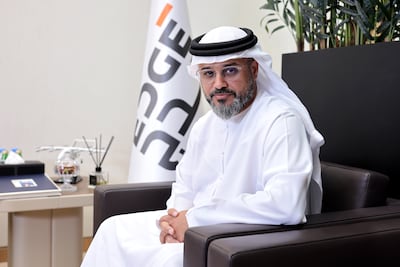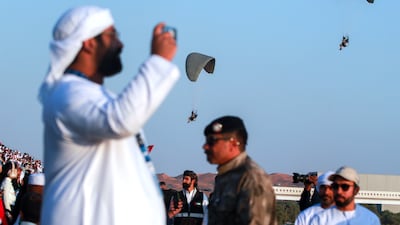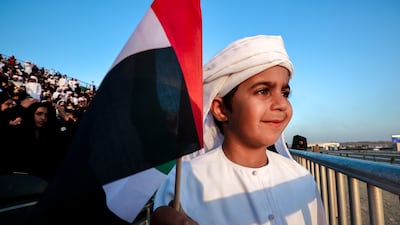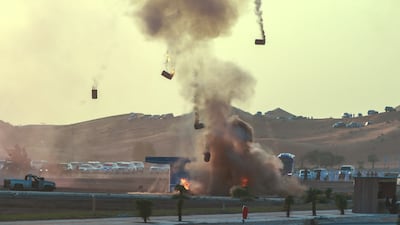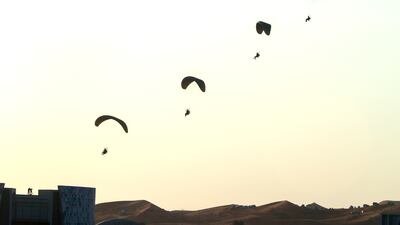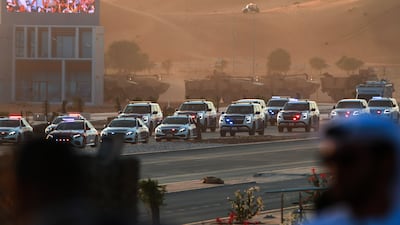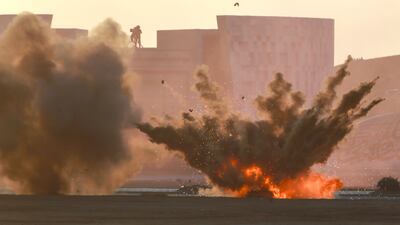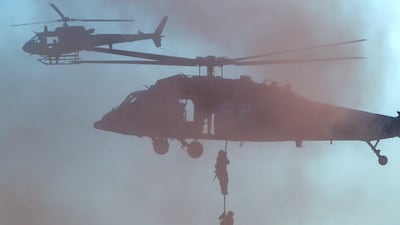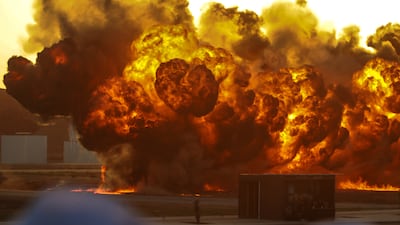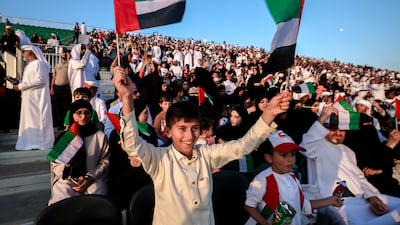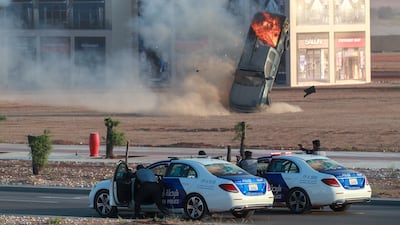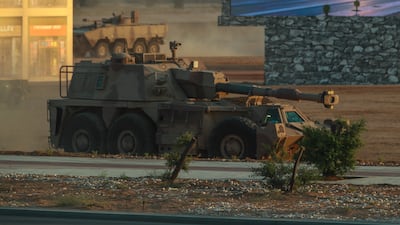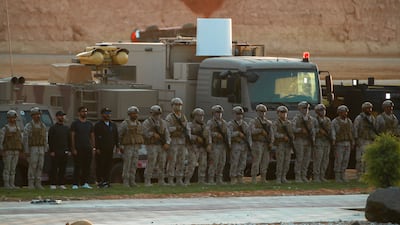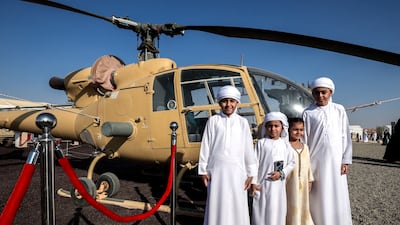The Gulf has been on tenterhooks in recent weeks, until news of the ceasefire between Iran and Israel was met with a collective sigh of relief.
Conflict in this region, so close to home, is unfortunately nothing new, and at times like these lessons from the past can provide the greatest value. Sometimes, the ability to exercise force can be the best form of defence.
This was a lesson not lost on the Emirates when Saddam Hussein's Iraq invaded Kuwait in 1990. It was at this moment, Hamad Al Marar told The National, that the UAE saw how vulnerable nations could be without control over their own defence capabilities.
The managing director and chief executive of Edge, the biggest defence conglomerate in the country, said it bore the seed of a homegrown industry built to protect national sovereignty.
What role does Edge play today?
“The defence industry in the UAE dates back to 1991,” he said. “Post the Iraqi invasion of Kuwait, the UAE saw the importance of starting the defence industry and creating sovereignty in several domains.”
Today, Edge is at the heart of that vision. Established in November 2019, the group was formed through a wave of mergers and acquisitions that brought together more than 35 entities into six advanced technology and defence clusters.
“Edge is the national champion when it comes to defence,” Mr Al Marar said. “We serve everything from the bullet to the satellite.”
That includes land, sea and air platforms, electronic warfare, cyber defence and homeland security. The group is also focused on artificial intelligence, smart materials, robotics and 3D printing.
Of more than 200 defence products currently in Edge's portfolio, more than 80 per cent are manufactured locally – a number the group is very proud of. The group also has a presence in more than 100 countries, with entities in Latin America, three in Europe and plans to expand to Asia and Africa.
In a move that goes full circle to Mr Al Marar's point that the UAE's military awakening came in 1991, one of the group's most recent deals was the sale of supply ships to Kuwait. Even with this scale, Mr Al Marar sees Edge as a company driven by agility, constantly adapting to new threats and technologies.
“Everything happening around us makes us rethink the way we used to design or produce,” he said. “New manufacturing methods, from steel printing to intelligent platforms, are part of this evolution. Technology is maturing, making lots of missions possible and we do see a dual use in many of the applications and technologies we have today.”
Keeping us safe
Particularly in the light of recent geopolitical tensions, Mr Al Marar said deterrence, not destruction, is always the goal.
“Why is there always the idea that conflict should be an army or a nation against another nation?” Illicit fishing and drug smuggling, he said, can be as much of a security threat as any army, which is why “readiness” remains the guiding principle.
“I always take this example,” he said. “You might go to the gym to stay healthy. Those hours in the gym are actually the inventory of weapons. You have to be strong. In the presence of CCTV, over 90 per cent of thefts are eliminated. So when people know you’re armed, it’s less likely they will attack you.”
He said Abu Dhabi is considered one of the safest cities in the world not because its people are different, but because of strategy and technology.
Building a legacy of success
That philosophy is also reflected in Edge's internal culture. The group has more than 14,000 employees, including 3,000 engineers – 50 per cent of them Emiratis, and 82 per cent of the Emiratis are women.
In June, Edge won gold at the 2025 Employee Happiness Awards, in the category of Best Company to Work For (Large). It was also certified as a Great Place to Work in December 2024.
“It’s software, it’s material science, it’s robotics,” Mr Al Marar said. “It’s the finest form of design – basically heaven for engineers.”
His own journey is proof of the Emirati talent Edge celebrates. While many of his peers studied abroad, he stayed to study accounting at the Higher Colleges of Technology. Smiling, he added that he cannot live for long outside the Emirates because of his love for home. “I basically cannot live for long outside the country. I like it here.”
He started his career in the early days of Tawazun, a UAE-based government entity focused on defence and security acquisition, and has spent more than 20 years in the industry. “I was fortunate to be at the right place at the right time and worked with brilliant teams to actually see this industry get formed in the way we see today.”
His biggest hope is to leave behind an industry that is fully sovereign. “I have a soft spot for self-determination,” he said. “And I want to be a reason to give the UAE the ability to defend and the ability to strike.”
The next chapter, he said, will focus on technological upgrades and continuous improvement. “Everything we’ve done fits into the bigger picture,” he said. “It’s a strategy to make the UAE sovereign. And the real asset of the country – it’s not the machines. It’s the people.”
How the past helps us look forward
The UAE's armed forces officially unified in 1976 and have participated in multiple conflicts since. The first major contribution was in the Arab Deterrent Force peacekeeping mission in Lebanon in the late 1970s. Yet, as Mr Al Marar noted, the Gulf War was arguably a watershed moment.
The UAE Army participated in the conflict, with 10 Emiratis losing their lives in the liberation of Kuwait from Iraq. Three decades after that invasion, the UAE isn't just protecting itself – it is proving what local vision and talent can accomplish.
UAE's military strength on show at Union Fortress 10 parade – in pictures
Will the pound fall to parity with the dollar?
The idea of pound parity now seems less far-fetched as the risk grows that Britain may split away from the European Union without a deal.
Rupert Harrison, a fund manager at BlackRock, sees the risk of it falling to trade level with the dollar on a no-deal Brexit. The view echoes Morgan Stanley’s recent forecast that the currency can plunge toward $1 (Dh3.67) on such an outcome. That isn’t the majority view yet – a Bloomberg survey this month estimated the pound will slide to $1.10 should the UK exit the bloc without an agreement.
New Prime Minister Boris Johnson has repeatedly said that Britain will leave the EU on the October 31 deadline with or without an agreement, fuelling concern the nation is headed for a disorderly departure and fanning pessimism toward the pound. Sterling has fallen more than 7 per cent in the past three months, the worst performance among major developed-market currencies.
“The pound is at a much lower level now but I still think a no-deal exit would lead to significant volatility and we could be testing parity on a really bad outcome,” said Mr Harrison, who manages more than $10 billion in assets at BlackRock. “We will see this game of chicken continue through August and that’s likely negative for sterling,” he said about the deadlocked Brexit talks.
The pound fell 0.8 per cent to $1.2033 on Friday, its weakest closing level since the 1980s, after a report on the second quarter showed the UK economy shrank for the first time in six years. The data means it is likely the Bank of England will cut interest rates, according to Mizuho Bank.
The BOE said in November that the currency could fall even below $1 in an analysis on possible worst-case Brexit scenarios. Options-based calculations showed around a 6.4 per cent chance of pound-dollar parity in the next one year, markedly higher than 0.2 per cent in early March when prospects of a no-deal outcome were seemingly off the table.
Bloomberg
Global state-owned investor ranking by size
|
1.
|
United States
|
|
2.
|
China
|
|
3.
|
UAE
|
|
4.
|
Japan
|
|
5
|
Norway
|
|
6.
|
Canada
|
|
7.
|
Singapore
|
|
8.
|
Australia
|
|
9.
|
Saudi Arabia
|
|
10.
|
South Korea
|
The smuggler
Eldarir had arrived at JFK in January 2020 with three suitcases, containing goods he valued at $300, when he was directed to a search area.
Officers found 41 gold artefacts among the bags, including amulets from a funerary set which prepared the deceased for the afterlife.
Also found was a cartouche of a Ptolemaic king on a relief that was originally part of a royal building or temple.
The largest single group of items found in Eldarir’s cases were 400 shabtis, or figurines.
Khouli conviction
Khouli smuggled items into the US by making false declarations to customs about the country of origin and value of the items.
According to Immigration and Customs Enforcement, he provided “false provenances which stated that [two] Egyptian antiquities were part of a collection assembled by Khouli's father in Israel in the 1960s” when in fact “Khouli acquired the Egyptian antiquities from other dealers”.
He was sentenced to one year of probation, six months of home confinement and 200 hours of community service in 2012 after admitting buying and smuggling Egyptian antiquities, including coffins, funerary boats and limestone figures.
For sale
A number of other items said to come from the collection of Ezeldeen Taha Eldarir are currently or recently for sale.
Their provenance is described in near identical terms as the British Museum shabti: bought from Salahaddin Sirmali, "authenticated and appraised" by Hossen Rashed, then imported to the US in 1948.
- An Egyptian Mummy mask dating from 700BC-30BC, is on offer for £11,807 ($15,275) online by a seller in Mexico
- A coffin lid dating back to 664BC-332BC was offered for sale by a Colorado-based art dealer, with a starting price of $65,000
- A shabti that was on sale through a Chicago-based coin dealer, dating from 1567BC-1085BC, is up for $1,950
THE BIO
Born: Mukalla, Yemen, 1979
Education: UAE University, Al Ain
Family: Married with two daughters: Asayel, 7, and Sara, 6
Favourite piece of music: Horse Dance by Naseer Shamma
Favourite book: Science and geology
Favourite place to travel to: Washington DC
Best advice you’ve ever been given: If you have a dream, you have to believe it, then you will see it.
About Seez
Company name/date started: Seez, set up in September 2015 and the app was released in August 2017
Founder/CEO name(s): Tarek Kabrit, co-founder and chief executive, and Andrew Kabrit, co-founder and chief operating officer
Based in: Dubai, with operations also in Kuwait, Saudi Arabia and Lebanon
Sector: Search engine for car buying, selling and leasing
Size: (employees/revenue): 11; undisclosed
Stage of funding: $1.8 million in seed funding; followed by another $1.5m bridge round - in the process of closing Series A
Investors: Wamda Capital, B&Y and Phoenician Funds
'Worse than a prison sentence'
Marie Byrne, a counsellor who volunteers at the UAE government's mental health crisis helpline, said the ordeal the crew had been through would take time to overcome.
“It was worse than a prison sentence, where at least someone can deal with a set amount of time incarcerated," she said.
“They were living in perpetual mystery as to how their futures would pan out, and what that would be.
“Because of coronavirus, the world is very different now to the one they left, that will also have an impact.
“It will not fully register until they are on dry land. Some have not seen their young children grow up while others will have to rebuild relationships.
“It will be a challenge mentally, and to find other work to support their families as they have been out of circulation for so long. Hopefully they will get the care they need when they get home.”
Mohammed bin Zayed Majlis
What is a robo-adviser?
Robo-advisers use an online sign-up process to gauge an investor’s risk tolerance by feeding information such as their age, income, saving goals and investment history into an algorithm, which then assigns them an investment portfolio, ranging from more conservative to higher risk ones.
These portfolios are made up of exchange traded funds (ETFs) with exposure to indices such as US and global equities, fixed-income products like bonds, though exposure to real estate, commodity ETFs or gold is also possible.
Investing in ETFs allows robo-advisers to offer fees far lower than traditional investments, such as actively managed mutual funds bought through a bank or broker. Investors can buy ETFs directly via a brokerage, but with robo-advisers they benefit from investment portfolios matched to their risk tolerance as well as being user friendly.
Many robo-advisers charge what are called wrap fees, meaning there are no additional fees such as subscription or withdrawal fees, success fees or fees for rebalancing.
The%20specs%20
%3Cp%3E%3Cstrong%3EEngine%3A%20%3C%2Fstrong%3E2.0-litre%204cyl%20turbo%0D%3Cbr%3E%3Cstrong%3EPower%3A%20%3C%2Fstrong%3E261hp%20at%205%2C500rpm%0D%3Cbr%3E%3Cstrong%3ETorque%3A%20%3C%2Fstrong%3E400Nm%20at%201%2C750-4%2C000rpm%0D%3Cbr%3E%3Cstrong%3ETransmission%3A%20%3C%2Fstrong%3E7-speed%20dual-clutch%20auto%0D%3Cbr%3E%3Cstrong%3EFuel%20consumption%3A%20%3C%2Fstrong%3E10.5L%2F100km%0D%3Cbr%3E%3Cstrong%3EOn%20sale%3A%20%3C%2Fstrong%3ENow%0D%3Cbr%3E%3Cstrong%3EPrice%3A%20%3C%2Fstrong%3EFrom%20Dh129%2C999%20(VX%20Luxury)%3B%20from%20Dh149%2C999%20(VX%20Black%20Gold)%3C%2Fp%3E%0A
UAE currency: the story behind the money in your pockets
In numbers: PKK’s money network in Europe
Germany: PKK collectors typically bring in $18 million in cash a year – amount has trebled since 2010
Revolutionary tax: Investigators say about $2 million a year raised from ‘tax collection’ around Marseille
Extortion: Gunman convicted in 2023 of demanding $10,000 from Kurdish businessman in Stockholm
Drug trade: PKK income claimed by Turkish anti-drugs force in 2024 to be as high as $500 million a year
Denmark: PKK one of two terrorist groups along with Iranian separatists ASMLA to raise “two-digit million amounts”
Contributions: Hundreds of euros expected from typical Kurdish families and thousands from business owners
TV channel: Kurdish Roj TV accounts frozen and went bankrupt after Denmark fined it more than $1 million over PKK links in 2013
